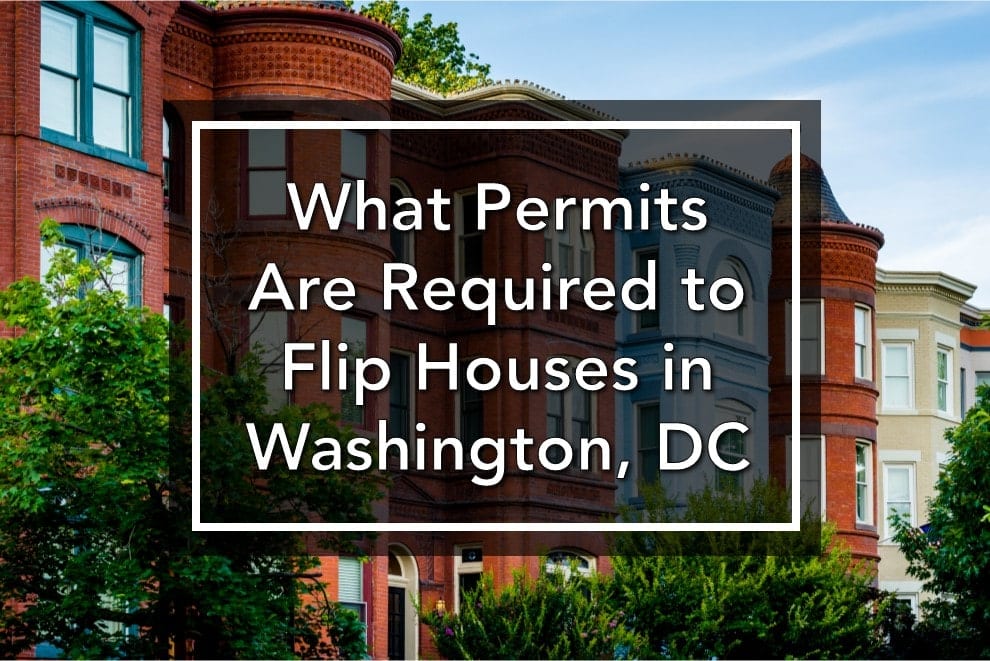Ready to flip your first house in the District but not sure about the required permits? If your real estate investing strategy is single-family homes then keep reading! If you’re looking to learn about the permits required for DC Condo Conversions.
Types of permits related to DC renovations and residential construction:
- Building Permits
- Supplemental Systems Installation (A/C, electric, etc.)
- Water and Sewer excavation
- Public Space Permits
One of the big benefits for real estate investors in Washington D.C. is that individuals are not required to have a real estate license to flip houses in the District, but all renovations to the houses, condos, and properties will require the investor to have the proper permits.
Permits are required to flip houses in DC for a few reasons. The first is that it will ensure all fixes and rehabs are up to modern code standards. The second is that permits protect the buyer or renter who will be living in your completed project. The third reason that DC enforces permits is that they require the work on your property to be done by a licensed professional.
All of these permits can also be your saving grace if the quality of your property is ever called into question, as they ensure that proper work was done and everything in your project was up to code at the time. The DCRA is the governing body that approves and enforces construction-related permits in the District, so be sure to browse their resources to double-check which permits apply to your project.
Now that you know which permits are required and recommended for flipping houses in DC, let’s go into some frequently asked questions.
Is it legally required to have permits to flip a house in DC?
In Washington D.C., the law requires a building permit for construction on any existing structure. A building permit must include a specific scope of work, and the plans must be approved for renovations to be completed.
Required building permits for investors in DC include:
- New construction
- Additions, alterations, and repairs
- Razes
- Demolitions
- Construction of any walls, fences, garages, or sheds.
- Signs or awnings
- A change in the layout of interior space (changing the floor plan to the building in any way, for example splitting one six-room apartment into two units with three-room apartments)
- Water or sewer excavation, along with supplemental systems installation permits for renovations that include plumbing, electric, and A/C, both require separate sets of permits. Only licensed D.C. contractors for the specific trade at hand are eligible to apply for these permits.
- Public Space permits are required when small structures such as a dumpster or a retaining wall are being installed in the space between the house and the curb, known as a public space.
What could happen if you flip without permits?
The easy answer is financial damage to you and your company. If you get caught performing construction without proper permitting, you will be likely be hit with a “Stop Work Order,” meaning all work is put on hold and you will be assessed a heavy fine. In addition to ensuring your construction moves along on pace and without fines, pulling all of your proper permits can be a major ally should you find yourself in a lawsuit with a buyer. Although permits are not a guarantee against potential litigation, the permits (paired with any required inspections) do serve as proof of credibility that the work was done accurately, and is up to standard and local building codes.
If during the inspection it turns out that the work was completed without meeting current standards, then you may need to fix the problems and have them re-inspected in order to continue construction and avoid a Stop Work Order.
The good news is that if you either pull permits yourself or work with a trusted contractor who consistently pulls them, none of these costly consequences will apply to you. In summary, if you are flipping a house or doing any other renovations in Washington DC, you need to pull permits. Some projects will have a unique set of permits required, so if you’d like specific insight on your next project, talk to one of our lending experts today!

